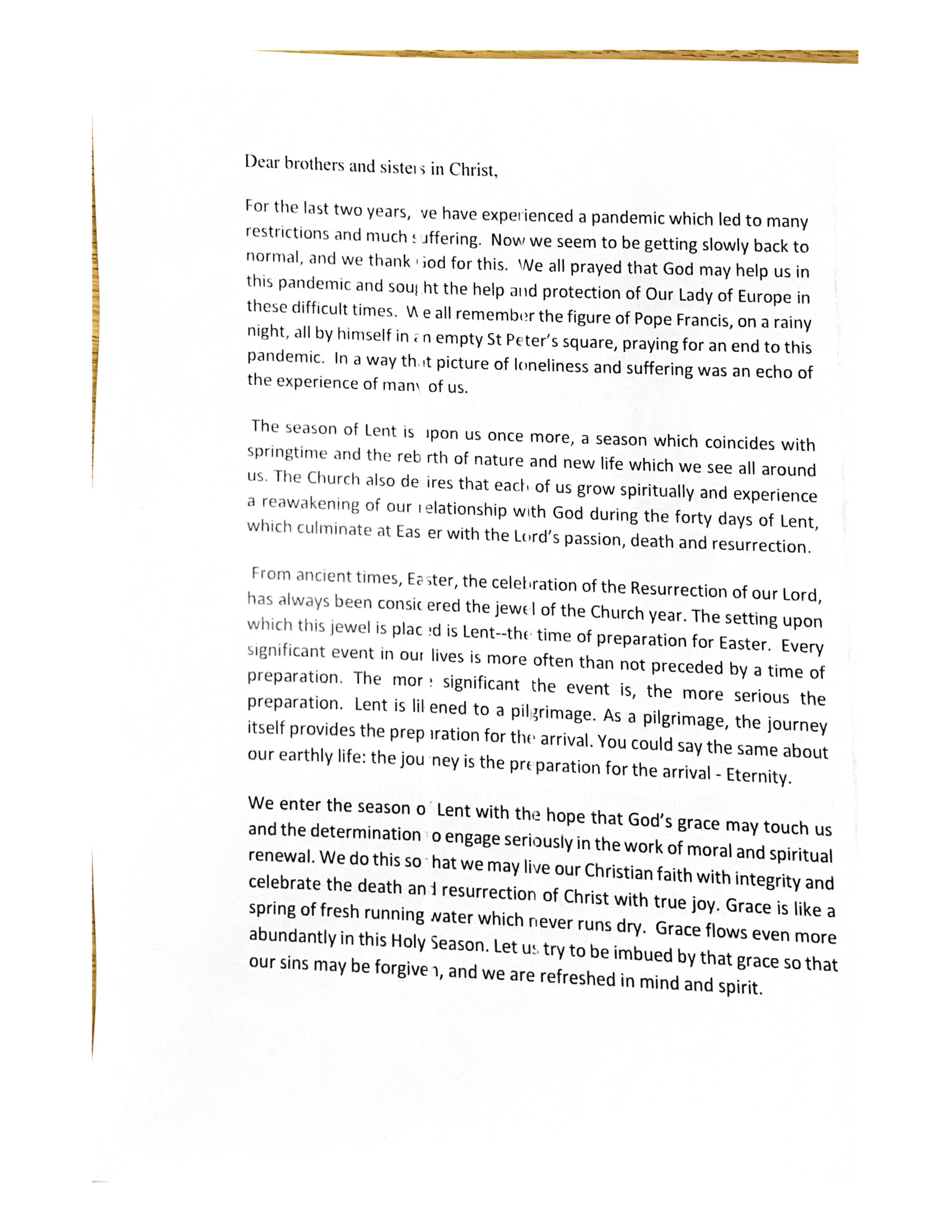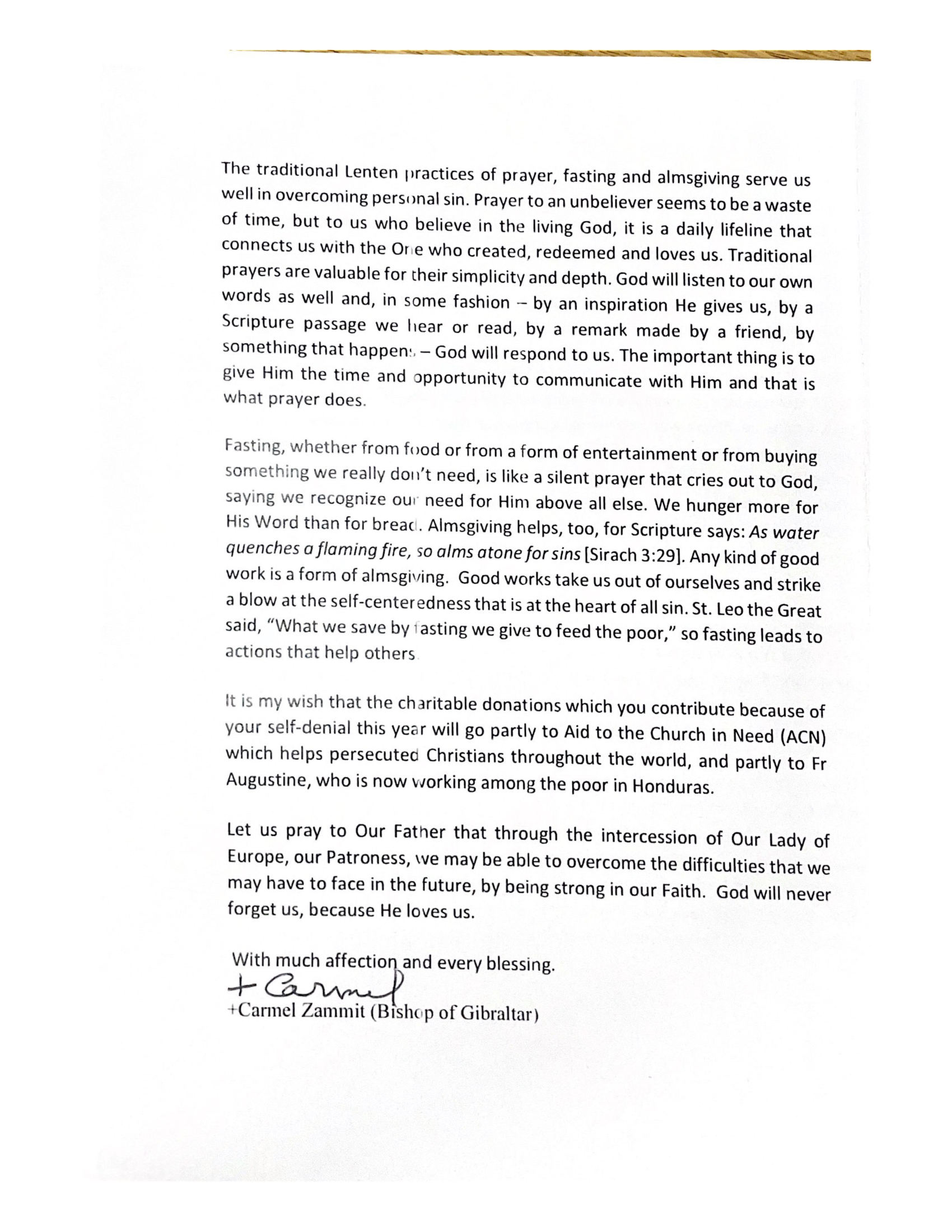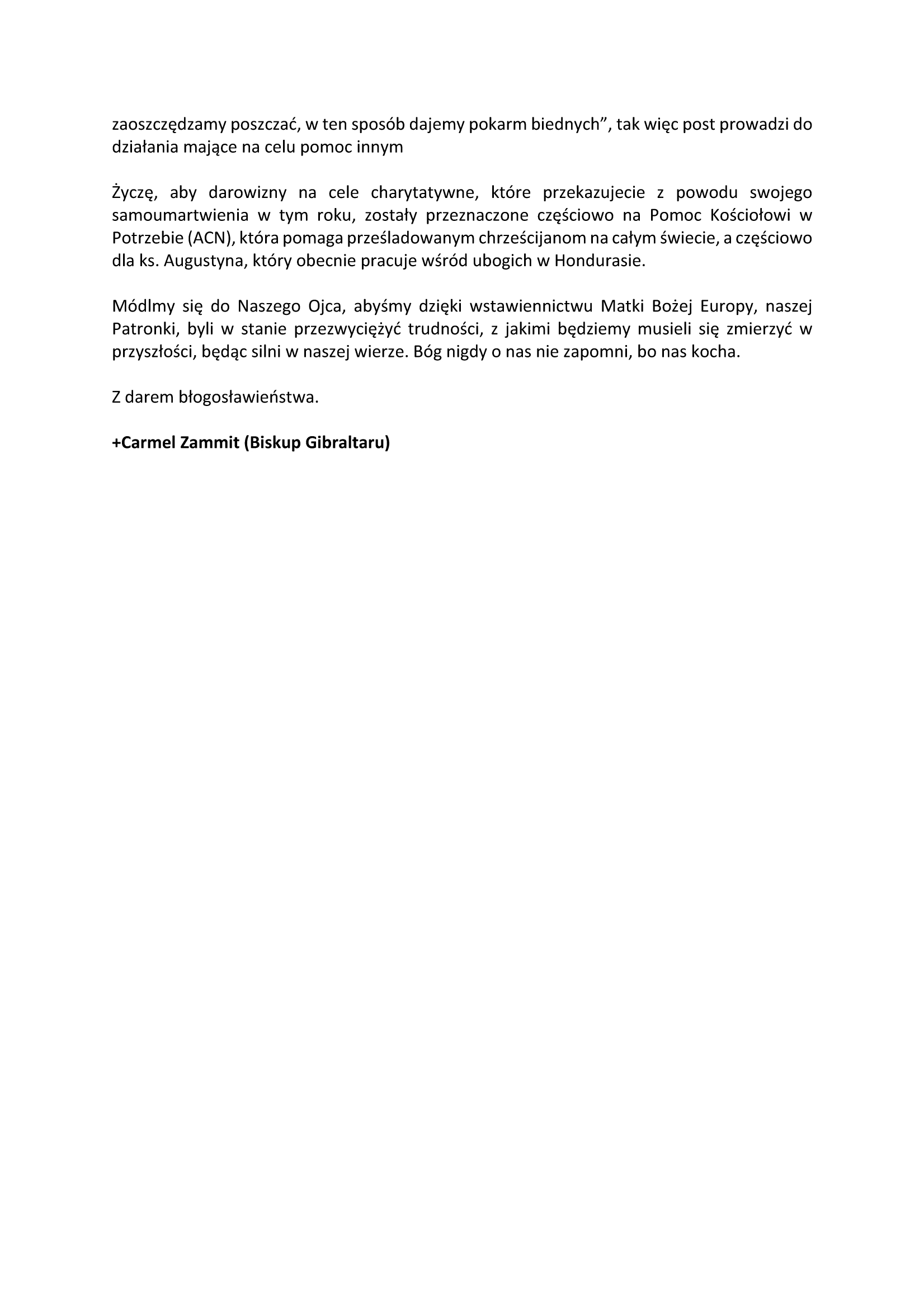In polish below... po polsku, poniżej...
Luke 15:1-3,11-32 |
|---|
The prodigal son
The Fourth Sunday of Lent gives us a very well know fragment of the Luke’s Gospel. These verses of the New Testament are called as the Parable about the Prodigal Son. In the world of painting, we have a unique work of Rembrandt, the Dutch Painter form the XVII century, showing the Father, embracing a Son, as repentant man, who came back to the father’s house. This scene is pretty much of compassion and love of the father, which was offended by the attitude of the Prodigal Son and his wastefulness.
This parable of Jesus had become a good occasion to say it, while many people came to Jesus for the guidance, how to change their lives, a lot of them were the people, who lost the sense of life. That situation met with anger of the Pharisees and the Scribes of Israel. For them, it was unacceptable to talk with the people, from the out of the society margin.
Among the antagonistic emotions and feeling, Jesus gives the parable, which makes everyone of us aware, any singular person needs God’s Mercy and forgiveness.
It is worth noting that, in the Gospel we can see the two brothers, the younger and the older one. Reading the Parable, we have some tendency to qualify, that the fist younger brother is that bad one and he is a negative person, because of his lack of respect to the father, and the second one was just and right, because he stayed home, and potentially he was obedient to the father.
The last part of the Gospel shows the whole truth about the second son, who reacted to the father with anger and complaints. His megalomania and the feeling of higher value made him pride and rebellious to his family, especially to his brother, who had become repented with the father.
His egoism made blind him for the forgiveness and love of the father towards the younger son. He could not understand, the younger brother is his family. The father’s words leave no doubt, your brother belongs to our family. He was lost, but he was found, again.
The message of the Gospel is clear, the two of them needed the forgiveness of the Father.
These words of Christ are toward us, we cannot qualify people, who need Mercy, or those, who do not need. The story about the brothers indicates the need of repentance for all of us.
The arms of God are open widely for every person, because we belong to the same family of the first men, who were contaminated by the original sin. God is waiting for me, as well.
The younger son teaches us about one thing, yet. He was so sorry, missing for his father and home. To such to a degree that, he wanted to become a slave of his father. His conversion was true. This Lenten time is a good occasion to do the same. As Christian we are encouraged to be embraced by the arms of the Heavenly Father, having pure intention and fervent heart, riding the mask of my relationship to God, as tradition, as the older brother was used to, and start to live with the authentic and living faith. Amen.
(Łk 15, 1-3.11-32)
W owym czasie przybliżali się do Jezusa wszyscy celnicy i grzesznicy, aby Go słuchać. Na to szemrali faryzeusze i uczeni w Piśmie, mówiąc: "Ten przyjmuje grzeszników i jada z nimi". Opowiedział im wtedy następującą przypowieść: "Pewien człowiek miał dwóch synów. Młodszy z nich rzekł do ojca: „Ojcze, daj mi część własności, która na mnie przypada”. Podzielił więc majątek między nich. Niedługo potem młodszy syn, zabrawszy wszystko, odjechał w dalekie strony i tam roztrwonił swoją własność, żyjąc rozrzutnie. A gdy wszystko wydał, nastał ciężki głód w owej krainie, i on sam zaczął cierpieć niedostatek. Poszedł i przystał na służbę do jednego z obywateli owej krainy, a ten posłał go na swoje pola, żeby pasł świnie. Pragnął on napełnić swój żołądek strąkami, którymi żywiły się świnie, lecz nikt mu ich nie dawał. Wtedy zastanowił się i rzekł: „Iluż to najemników mojego ojca ma pod dostatkiem chleba, a ja tu przymieram głodem. Zabiorę się i pójdę do mego ojca, i powiem mu: Ojcze, zgrzeszyłem przeciw Niebu i względem ciebie; już nie jestem godzien nazywać się twoim synem: uczyń mnie choćby jednym z twoich najemników”. Zabrał się więc i poszedł do swojego ojca. A gdy był jeszcze daleko, ujrzał go jego ojciec i wzruszył się głęboko; wybiegł naprzeciw niego, rzucił mu się na szyję i ucałował go. A syn rzekł do niego: „Ojcze, zgrzeszyłem przeciw Niebu i wobec ciebie, już nie jestem godzien nazywać się twoim synem”. Lecz ojciec powiedział do swoich sług: „Przynieście szybko najlepszą szatę i ubierzcie go; dajcie mu też pierścień na rękę i sandały na nogi! Przyprowadźcie utuczone cielę i zabijcie: będziemy ucztować i weselić się, ponieważ ten syn mój był umarły, a znów ożył; zaginął, a odnalazł się”. I zaczęli się weselić. Tymczasem starszy jego syn przebywał na polu. Gdy wracał i był blisko domu, usłyszał muzykę i tańce. Przywołał jednego ze sług i pytał go, co to ma znaczyć. Ten mu rzekł: „Twój brat powrócił, a ojciec twój kazał zabić utuczone cielę, ponieważ odzyskał go zdrowego”. Rozgniewał się na to i nie chciał wejść; wtedy ojciec jego wyszedł i tłumaczył mu. Lecz on odpowiedział ojcu: „Oto tyle lat ci służę i nie przekroczyłem nigdy twojego nakazu; ale mnie nigdy nie dałeś koźlęcia, żebym się zabawił z przyjaciółmi. Skoro jednak wrócił ten syn twój, który roztrwonił twój majątek z nierządnicami, kazałeś zabić dla niego utuczone cielę”. Lecz on mu odpowiedział: „Moje dziecko, ty zawsze jesteś ze mną i wszystko, co moje, do ciebie należy. A trzeba było weselić się i cieszyć z tego, że ten brat twój był umarły, a znów ożył; zaginął, a odnalazł się”.
Czwarta Niedziela Wielkiego Postu daje nam bardzo dobrze znany fragment Ewangelii Łukasza. Te wersety Nowego Testamentu nazywane są Przypowieścią o Synu Marnotrawnym. W świecie malarstwa posiadamy unikatowe dzieło Rembrandta, holenderskiego malarza z XVII wieku, przedstawiające Ojca, obejmującego Syna jako skruszonego człowieka, który wrócił do domu ojca. Ta scena jest w dużej mierze współczuciem i miłością ojca, który był urażony postawą syna marnotrawnego i jego marnotrawstwem.
Ta przypowieść o Jezusie stała się dobrą okazją do jej opowiedzenia, podczas gdy wielu ludzi przychodziło do Jezusa po poradę, jak zmienić swoje życie, wielu z nich to ludzie, którzy stracili sens życia. Ta sytuacja spotkała się z buntowniczym podejściem Faryzeuszy i uczonych w Piśmie Izraela. Dla nich rozmowa z ludźmi z marginesu społecznego była niedopuszczalna.
Wśród antagonistycznych emocji, Jezus podaje przypowieść, która uświadamia każdemu z nas, że każda pojedyncza osoba potrzebuje Bożego Miłosierdzia i przebaczenia.
Warto zauważyć, że w Ewangelii widzimy dwóch braci, młodszego i starszego. Czytając przypowieść mamy pewną tendencję do uznania, że pierwszy młodszy brat jest tym złym i jest osobą negatywną ze względu na swoją postawę i niewierność ojcu, a drugi był sprawiedliwy, bo został w domu i potencjalnie był posłuszny ojcu.
Ostatnia część Ewangelii ukazuje całą prawdę o drugim synu, który reagował na decyzję ojca gniewem i skargami. Jego megalomania i poczucie większej wartości sprawiły, że był dumny i zbuntowany wobec swojej rodziny, zwłaszcza wobec brata, który pojednał się z ojcem.
Jego egoizm zaślepił potrzebę przebaczenie i miłość ojca do młodszego syna. Nie mógł zrozumieć, że młodszy syn jest jego bratem, należącym do rodziny. Słowa ojca nie pozostawiają wątpliwości, twój brat należy do naszej rodziny. Był zagubiony i odnalazł się.
Przesłanie Ewangelii jest jasne, oboje potrzebowali przebaczenia Ojca.
Te słowa Chrystusa są skierowane do nas, nie możemy kwalifikować ludzi, którzy potrzebują Miłosierdzia lub tych, którzy nie potrzebują. Historia o braciach wskazuje na potrzebę pokuty dla nas wszystkich.
Ramiona Boże są szeroko otwarte dla każdego człowieka, ponieważ należymy do tej samej rodziny pierwszych ludzi, którzy zostali skażeni grzechem pierworodnym. Bóg też na mnie czeka.
Młodszy syn uczy nas jeszcze jednej rzeczy. Było mu bardzo przykro, tęsknił za ojcem i domem, do tego stopnia, że chciał zostać niewolnikiem ojca. Jego nawrócenie było prawdziwe. Czas Wielkiego Postu jest ku temu dobrą okazją. Jako chrześcijanie jesteśmy zachęcani do zanurzenia się w ramionach Ojca Niebieskiego, mając czyste intencje i żarliwe serce, odrzucając maskę mojej relacji z Bogiem, jako tradycję, jak to miał w zwyczaju starszy brat, i zacząć żyć z autentyczną i żywą wiara. Amen.










